Background
I first saw this station in 2008 when I made a round trip on the Circle Line (described in the post The Circle Line, Yangon). Leaving Yangon Central station in a clockwise direction, after calling at small stations at Pha Yar Lan, Lanmadaw, Pyay Road, Shan Road, Ahlone Road and Pann Hlaing, the train paused at Kyee Myin Daing where there was a large two-storey station building, three platform faces and extensive sidings. I was immediately intrigued not only by the size of the station but by the fact that the area was controlled by two elderly mechanical signal boxes with mechanical operation of points. Although colour light signals were in use on the main running lines, a variety of lower-quadrant semaphore signals survived in the sidings. Unfortunately, none of the pictures I took on this round trip show Kyee Myin Daing.
In 2012 I travelled on part of the Circle Line (report here) but didn't pass through Kyee Myin Daing.
The following year, on 14th February 2013, I passed through the station on my way to and from the junction at Da Nyn Gone, producing pictures here and the post Yangon Area Railways.
On the 25th April 2014, I made a cab ride around the Circle line (see post Cab Ride around the Circle Line), adding a few more pictures of Kyee Myin Daing.
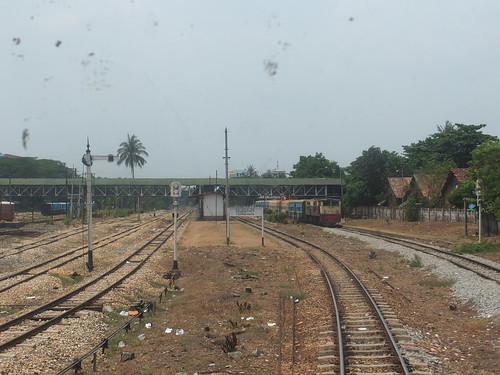 View of Kyee Myin Daing station from the cab of an Circle Line Train in 2014. Note the mixture of colour light and semaphore signals. DF1268 on right, heading for Yangon with a Down Train.
View of Kyee Myin Daing station from the cab of an Circle Line Train in 2014. Note the mixture of colour light and semaphore signals. DF1268 on right, heading for Yangon with a Down Train.
By 2015, the 'New' Diesel Multiple Units were being introduced and, on 4th May 2015, I went around the Circle line on one of these collecting more views in album The Circle Line by DMU.
Another 'New' Diesel Multiple Unit provided the motive power on 22nd April 2016 when I made another clockwise trip of the Circle Line with my young friend Aung (pictures here).
Origins of Kyee Myin Daing Station
Rail transport was first introduced in Myanmar in May 1877, when Lower Burma was a British colony, with the opening of the 163-mile (262 km) Yangon to Pyay line by The Irrawaddy Valley State Railway. At Yangon, the line terminated at Kyee Myin Daing, later being extended to what is now Yangon Central Station. I understand that, even today, some trains from Yangon to Pyay start at Kyee Myin Daing rather than Yangon Central Station.
 The impressive station building at Kyee Myin Daing.
The impressive station building at Kyee Myin Daing.
The Docks Branch
The British developed extensive docks on the north shore of the Yangon River which at one time carried heavy freight traffic. A single line still runs along the public side of the dock estate enclosing wall (parallel to Strand Road) with sidings, now reduced, leading into the docks at strategic locations. General goods depots are maintained at War Dan (on the river side of the line) and Botataung (on the landward side of the line). I'd walked along the eastern part of the dock line in 2014 (report here with pictures along the dock branch here), when I discovered that part of the branch had be re-laid as dual-gauge (metre/standard gauge). It was much later that I realised the standard gauge was for Yangon's embryonic tram system, which I visited on 21st April 2016 (report here, pictures here).
This single dock line connects to the main railway network at each end.
In the west, from War Dan the line turns inland, heading north to run parallel with the main line from Pann Hlaing, finally joining at the south end of Kyee Myin Daing. In between Pann Hlaing and a point south of Kyee Myin Daing, I'd noticed a 'third rail' on the dock branch in 2015. However, I dismissed it as evidence of rail replacement, as this rail didn't appear to have rail fastenings. I'm afraid that it's only recently that checking the relevant pictures confirms the presence of dual-gauge concrete sleepers and a third rail laid in position and fishplated but, for the most part, not fastened down. I do not know whether this incomplete dual gauge extends to War Dan, thus linking up with the dual gauge observed along Strand Road referred to above.
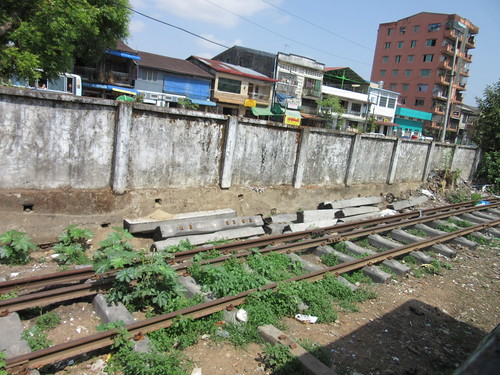 The Circle Line by DMU in 2015: South of Kyee Myin Daing the docks branch is now dual-gauge, here with rail fastenings.
The Circle Line by DMU in 2015: South of Kyee Myin Daing the docks branch is now dual-gauge, here with rail fastenings.
At the eastern end of the docks, the line turns north to make a junction with the main lines near Pazundaung, giving access to the major marshalling yard at Mahlwagon (discussed in the post here.
Kyee Myin Daing North and South Signal Cabins
Since I was young, I've had an interest in railway signalling and mechanical signal boxes (see the post Visiting Signalboxes) so the two part-mechanical signal cabins at Kyee Myin Daing North and South, as the only surviving mechanical cabins on the Circle Line, fascinate me. I was further intrigued because in the post Yangon Area Railways, I reported that Burma Railways placed an order in January 1946 with the Westinghouse Brake and Signal Company for two Style 'L' miniature lever frames for Burma Railways, intended for 'Rangoon' and 'Kemmendine'. The 'Kemmendine' lever frame order called for 47 levers made up of 12 point levers, 28 signal levers, 6 spare levers and 1 spare space. The 'Rangoon' miniature lever frame was installed at Yangon Central and remains in use (as described here) but what became of the other frame order is currently a mystery.
The main line through Kyee Myin Daing is double track and is flanked to the north and south by 'Automatic Block' areas with colour-light signals, where the occupation of an electrical track circuit by a passing train replaces each signal to 'danger', reverting to 'proceed' for a following train when the first train has passed clear of the track circuit. There is no manual block working and, in theory, trains arrive in accordance with the timetable.
Mechanical operation of points has been retained, with facing points provided with facing point locks and locking bars as was standard British Practice in the mechanical era. There's a brief description of the arrangement in the post Railway Signalling in Britain: Part 6 - Mechanical Operation of Points.
My visit on 6th May, 2016
I travelled on the Circle Line from Yangon Central Station to Insein and back, breaking my journey on the outward leg at Kyee Myin Daing to allow me to explore on foot. All my pictures from this trip are in the album Yangon to Insein by Train but my pictures in and around the station at Kyee Myin Daing, taken on this trip and on other occasions are in the album here.
Recent Developments
The sidings at Kyee Myin Daing, presumably originally busy with freight to and from the docks, have been fairly quiet in recent times but my latest visit revealed new activity which seems to be a rail-handling facility in connection with the introduction of long welded rails. An expensive-looking Plasser and Theurer APT500C containerised flash-butt welding machine, mounted on a Myanmar Railways bogie flat car, was operating periodically.
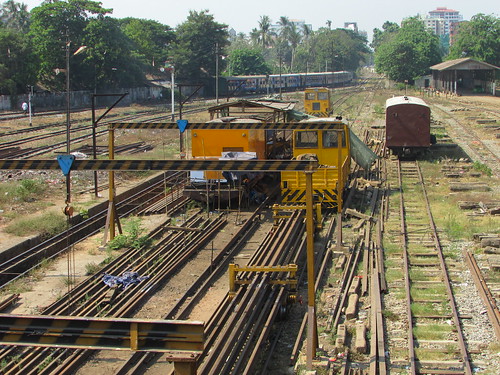 Circle Line, Yangon: The Rail Welding Yard at Kyee Myin Daing. In the background, Bo-Bo-Bo DF 1263 leaves the station with a Down train for Yangon.
Circle Line, Yangon: The Rail Welding Yard at Kyee Myin Daing. In the background, Bo-Bo-Bo DF 1263 leaves the station with a Down train for Yangon.
Kyee Myin Daing South Signal Cabin
During my perambulation on 6th May 2016, I was fortunate enough to be invited into Kyee Myin Daing South Signal Cabin, revealing additional information and producing the album Kyee Myin Daing South Signal Cabin.
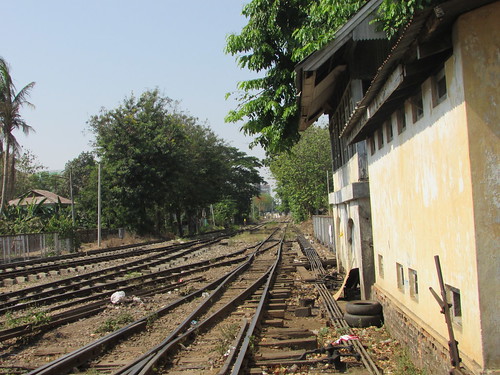 Kyee Myin Daing South Signal Cabin, with the Relay Room in the foreground, looking towards Yangon Central. The running lines are (L-R) Down, Up, Dock Branch.
Kyee Myin Daing South Signal Cabin, with the Relay Room in the foreground, looking towards Yangon Central. The running lines are (L-R) Down, Up, Dock Branch.
The low base structure forming the locking room is brick with arched panels cemented over for protection. The operating floor has windows on three sides and a corrugated iron roof, lined on the inside. Access is via a short wooden flight of steps to the rear. Footwear is not worn inside the cabin. The operating floor has a 48-lever mechanical frame fitted so that the signalmen face the tracks to operate the frame which is marked 'W B & S S Co Ltd' for Westinghouse Brake and Saxby Signal Company Limited. This is the name adopted in 1920 when Westinghouse absorbed a number of signal companies, including Saxby and Farmer India. Lever colours are generally as British practice:-
Points: Black
Facing Point Locks and Locking Bars: Blue
Stop Signals: Red
Spare: White
All levers have an identifications plate with the lever number, function and 'pulls' painted on in English. However, they were not all legible. I discovered that there is electro-mechanical Control between the two signal cabins at Kyee Myin Daing on the five through roads (Down, Up, Reversible Loop and two Reversible Goods Loops). At Kyee Myin Daing South Signal Cabin, levers 1 to 5 are painted Yellow and are used as 'Acceptance Levers', in conjunction with electric lever locks and circuit controllers at both the South Cabin and North Cabin to provide the necessary control.
A substantial framework made from U-section steel is fitted behind the frame and this carries electric lever locks and circuit controllers.
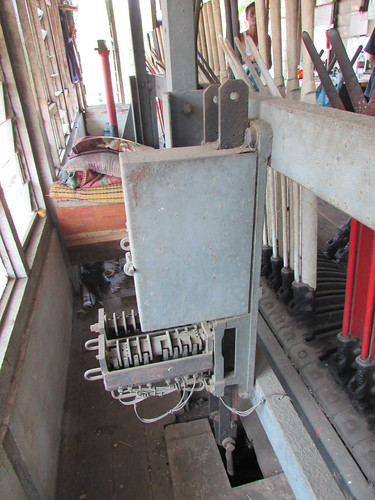
The U-section frame carries Lever Locks and Circuit Controllers.
The cabin controls five colour light signals on the Down, Up and Reversible Loop lines. These signals, and the status of the associated (mechanically operated) points are shown on an illuminated track diagram of the mosaic pattern. The illuminated track diagram does not show the semaphore signals on the goods lines but these are detailed on an old-fashioned framed signal box diagram in Burmese. The colour light Up Home signal controls 4 routes (L-R: Goods Line 6, Goods Line 5, Reversible Loop Line 4, Up Line 3). The signal has an unusual route indicator comprising five stencil indicators mounted together to form a horizontal bar which displays an (Arabic) numberal for the line number. In the signal box, four indicator units mounted on a column behind the frame confirm the line number displated to the signalman.
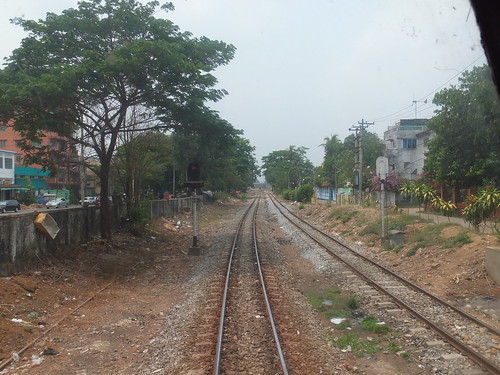 The colour light Up Home signal controls 4 routes (L-R: Goods Line 6, Goods Line 5, Reversible Loop Line 4, Up Line 3) displayed by an unusual route indicator comprising five stencil indicators mounted together to form a horizontal bar.
The colour light Up Home signal controls 4 routes (L-R: Goods Line 6, Goods Line 5, Reversible Loop Line 4, Up Line 3) displayed by an unusual route indicator comprising five stencil indicators mounted together to form a horizontal bar.
The adjacent single storey building is divided into a messroom and a locked section, assumed to be the relay room.
Note that the Down Main is designated Line 1 and the adjacent Up Main Line 3. There is space for a through line 2, not provided, but I've not determined whether it was removed or never installed. Certainly, there are Spare (White) levers in the frame which could have been associated with a through line.
Related posts in this blog
The Circle Line, Yangon (2008).
Exploring Yangon's railways.
Railway Signalling in Burma - Part 1: Semaphore Signals.
Railway Signalling in Burma - Part 2: Colour Light Signals & Motor Points.
Railway Signalling in Burma - Part 3: Control of Trains.
Railway Signalling in Burma - Part 4: Manual Control of Points and Interlocking.
Railway Signalling in Burma - Part 5: Signal Boxes with Interlocking Frames.
Railway Signalling in Burma - Part 6: Signal Boxes with Electrical Interlocking.
Yangon Area Railways
All my Myanma Railways posts.
My Pictures
Kyee Myin Daing.
Kyee Myin Daing South Signal Cabin.
Yangon to Insein by Train.
Cab Ride on the Circle Line (2014).
The Circle Line, Yangon (2013).
Circle Line Revisited (2012).
The Circle Line by DMU.
The Circle Line, Yangon, Myanmar (2009).
Burma: Colour Light Signals & Motor Points.
Yangon Central Station.
Railways in Myanmar (2008).
All my Myanma Railways Pictures.
